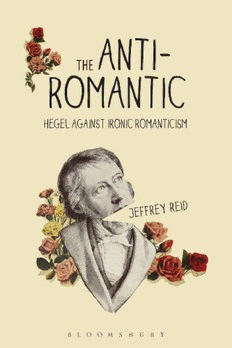Table Of ContentThe Anti-Romantic
Also available from Bloomsbury
German Romantic Criticism: Novalis, Schlegel, Schleiermacher, and others,
edited by A. Leslie Willson
Idealism and Existentialism, Jon Stewart
The Bloomsbury Companion to Hegel, edited by Allegra de Laurentiis
and Jeffrey Edwards
The Anti-Romantic
Hegel Against Ironic Romanticism
Jeffrey Reid
LONDON • NEW DELHI • NEW YORK • SYDNEY
Bloomsbury Academic
An imprint of Bloomsbury Publishing Plc
50 Bedford Square 1385 Broadway
London New York
WC1B 3DP NY 10018
UK USA
www.bloomsbury.com
Bloomsbury is a registered trade mark of Bloomsbury Publishing Plc
First published 2014
© Jeffrey Reid, 2014
Jeffrey Reid has asserted his right under the Copyright, Designs and
Patents Act, 1988, to be identified as Author of this work.
All rights reserved. No part of this publication may be reproduced or transmitted in
any form or by any means, electronic or mechanical, including photocopying, recording,
or any information storage or retrieval system, without prior permission in writing
from the publishers.
No responsibility for loss caused to any individual or organization acting on or
refraining from action as a result of the material in this publication can be
accepted by Bloomsbury Academic or the author.
British Library Cataloguing-in-Publication Data
A catalogue record for this book is available from the British Library.
ISBN: HB: 978-1-4725-7481-7
ePDF: 978-1-4725-7482-4
ePub: 978-1-4725-7483-1
Library of Congress Cataloging-in-Publication Data
A catalog record for this book is available from the Library of Congress.
Typeset by Integra Software Services Pvt. Ltd.
To my loved ones
Contents
Acknowledgments viii
Introduction 1
1 Friedrich Schlegel 9
Sophistry and seduction 11
Pretensions of the artistic “Virtuoso” 22
Pleasure and vanity 39
Intermezzo 1: Words and things 51
Scientific objectivity and discourse 51
True content: The “Name” and the “Word” 54
Scientific grammar: From predication to syllogism 57
The real words of objective spirit 60
The actuality of Science 62
Ironic discourse and the Vereitelung of true objectivity 62
2 Novalis 65
The Novalis distinction 65
Pathological irony 73
The beautiful soul and unhappy consciousness 83
Intermezzo 2: Irony and barbarities 91
The language of barbarity 93
Relation to objectivity: Empiricism and skepticism 95
3 Schleiermacher 97
Intuition and feeling 98
History of the understanding and the actuality of irony 108
Conclusion 115
Coda 1: Galvanism and excitability in Friedrich Schlegel’s
theory of the fragment 121
Coda 2: Reflections on Novalis’s Logological Fragments 133
Notes 140
Bibliography 185
Index 191
Acknowledgments
This book is a new, revised, augmented, translated edition of my L’ anti-
romantique: Hegel contre le romantisme ironique (Presses de l’Université
Laval, 2007, with the support of the Centre canadien d’études allemandes et
européennes). Versions of Intermezzo 1 have appeared in Jere Surber (ed.), Hegel
and Language (Albany: State University of New York Press, 2006), and in my
Real Words: Language and System in Hegel (Toronto: University of Toronto Press,
2007). Coda 1, “Galvanism and Excitability in Friedrich Schlegel’s Theory of the
Fragment,” appeared in Clio 38.1 (Fall 2008).
I would like to thank Jean-François Marquet for his philosophical inspiration.
I would also like to thank John Burbidge, Stephen Houlgate, Simon Lumsden,
and Jere Surber for their helpful comments on this book.
Introduction
It is safe to say that, in this book, more will be learned about Hegel than will be
learned about those representatives of Early German Romanticism that I am
dealing with: Friedrich Schlegel, Novalis, and Schleiermacher. My intention is
not to compare Hegel’s thought with the Romantics’—attempting to present
each in a neutral way, bringing them together in a philosophical confrontation
that might be observed objectively, in order to declare a winner or perhaps a
draw, maybe even concluding with a fair-minded synthesis showing that Hegel
is romantic and the Romantics are Hegelian.
Such a confrontation, according to my way of proceeding, could only take
place if it were textually based, and while it is clear that Hegel has much to say
about Early German (or Jena) Romanticism, the latter, which blossoms before
Hegelian philosophy finds its wings, remains mute with regard to him. Our
question is, consequently, the following: how does Hegel understand the Early
Romantic movement and its main protagonists? I will not attempt to prove or
demonstrate how his interpretation is or is not faithful. Let it be said right away
that Hegel’s interpretation is unfaithful, to the extent that it is strongly critical and
even polemical. As such, the Hegelian interpretation is far from demonstrating
or presenting a comprehensive knowledge of the theories and works of the Jena
Romantics, but rather shows itself to be highly selective regarding them. Hegel
hardly ever refers directly to the actual works of the Romantics. When he does
highlight a key expression in their writings, in order to make it the pivotal point
of his critical enterprise, we notice, looking closely at the texts that Hegel might
have been familiar with, that the expression often only appears in a marginal
fashion and in a context alien to the one evoked in the Hegelian critique.
Although it would be impossible to adequately present here an intellectual
movement as rich and multidimensional as the one found in Jena Romanticism,
I will quote, in endnotes, passages from the thinkers that Hegel deals with, in
order to provide some insight into their own thoughts. In giving them voice, we
may better appreciate their differences (or similarities) with regard to Hegel’s
critique. In the same vein, I have added two short chapters, in appendix, where
I attempt to faithfully present Friedrich Schlegel’s theory of irony and the
literary fragment, as well as Novalis’s Logological Fragments, divorced from any

